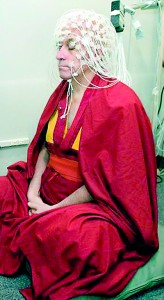Sunday Times 2
The world’s happiest man?
A French genetic scientist may seem like an unusual person to hold the title — but Matthieu Ricard is the world’s happiest man, according to researchers.
The 66-year-old turned his back on Parisian intellectual life 40 years ago and moved to India to study Buddhism. He is now a close confidante of the Dalai Lama and respected western scholar of religion.

Mr Ricard has undergone many tests to study how his 'enlightened' mind works
Now it seems daily meditation has had other benefits – enhancing Mr Ricard’s capacity for joy.
Neuroscientist Richard Davidson wired up the monk’s skull with 256 sensors at the University of Wisconsin as part of research on hundreds of advanced practitioners of meditation.
The scans showed that when meditating on compassion, Ricard’s brain produces a level of gamma waves – those linked to consciousness, attention, learning and memory – ‘never reported before in the neuroscience literature’, Davidson said.
The scans also showed excessive activity in his brain’s left prefrontal cortex compared to its right counterpart, giving him an abnormally large capacity for happiness and a reduced propensity towards negativity, researchers believe.
Research into the phenomenon, known as “neuroplasticity”, is in its infancy and Ricard has been at the forefront of ground-breaking experiments along with other leading scientists across the world.
‘We have been looking for 12 years at the effect of short and long-term mind-training through meditation on attention, on compassion, on emotional balance,’ he said.
‘We’ve found remarkable results with long-term practitioners who did 50,000 rounds of meditation, but also with three weeks of 20 minutes a day, which of course is more applicable to our modern times.’ He added to AFP: ‘It’s a wonderful area of research because it shows that meditation is not just blissing out under a mango tree but it completely changes your brain and therefore changes what you are.’
He believes meditation can alter the brain and improve people’s happiness in the same way that lifting weights puts on muscle. The son of philosopher Jean-Francois Revel and abstract watercolour painter Yahne Le Toumelin, became something of a celebrity after writing ‘The Monk And The Philosopher’ with his father. This was a dialogue on the meaning of life.
He followed up with a practical guide in 2011 called ‘The Art Of Meditation’ making the case for why others should follow the same path.
Ricard said: ‘That was the end of my quiet time because it was a bestseller. Suddenly I was projected into the western world. Then I did more dialogues with scientists and the whole thing started to spin off out of control.
‘I got really involved in science research and the science of meditation.’
A prominent monk in Kathmandu’s Shechen Monastery, Ricard divides his year between isolated meditation, scientific research and accompanying the Dalai Lama as his adviser on trips to French-speaking countries and science conferences.
He addressed the World Economic Forum in Davos at the height of the financial crisis in 2009 to tell gathered heads of state and business leaders it was time to give up greed in favour of “enlightened altruism”.
He was awarded the French National Order of Merit for his work in preserving Himalayan culture but it is his work on the science of happiness which perhaps defines him best.
Ricard sees living a good life, and showing compassion, not as a religious edict revealed from on high, but as a practical route to happiness.
‘Try sincerely to check, to investigate,’ he said.
‘That’s what Buddhism has been trying to unravel – the mechanism of happiness and suffering. It is a science of the mind.’
© Daily Mail, London
Follow @timesonlinelk
comments powered by Disqus




















